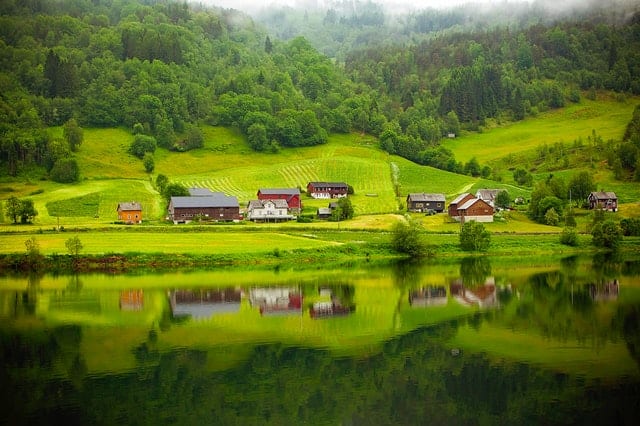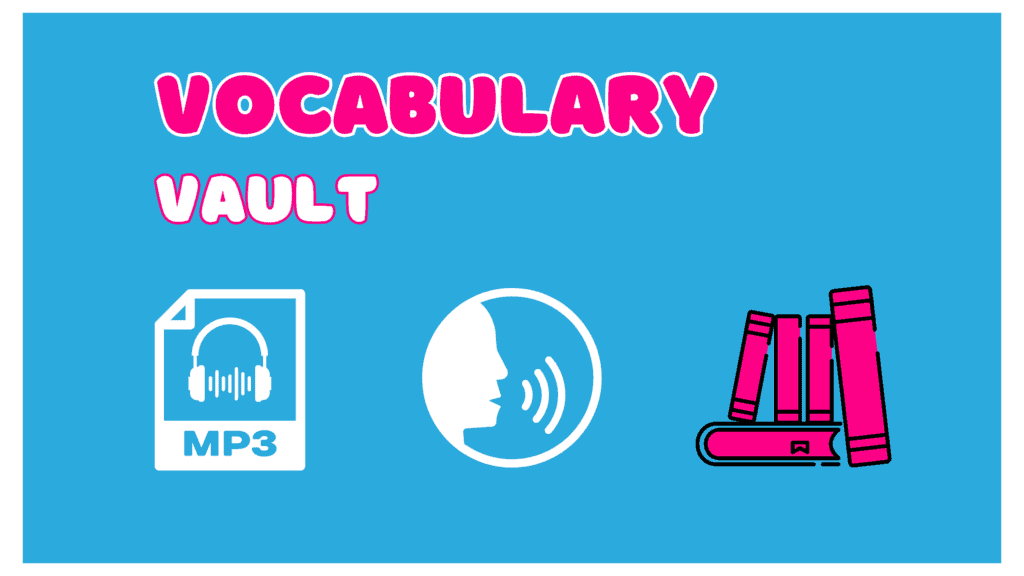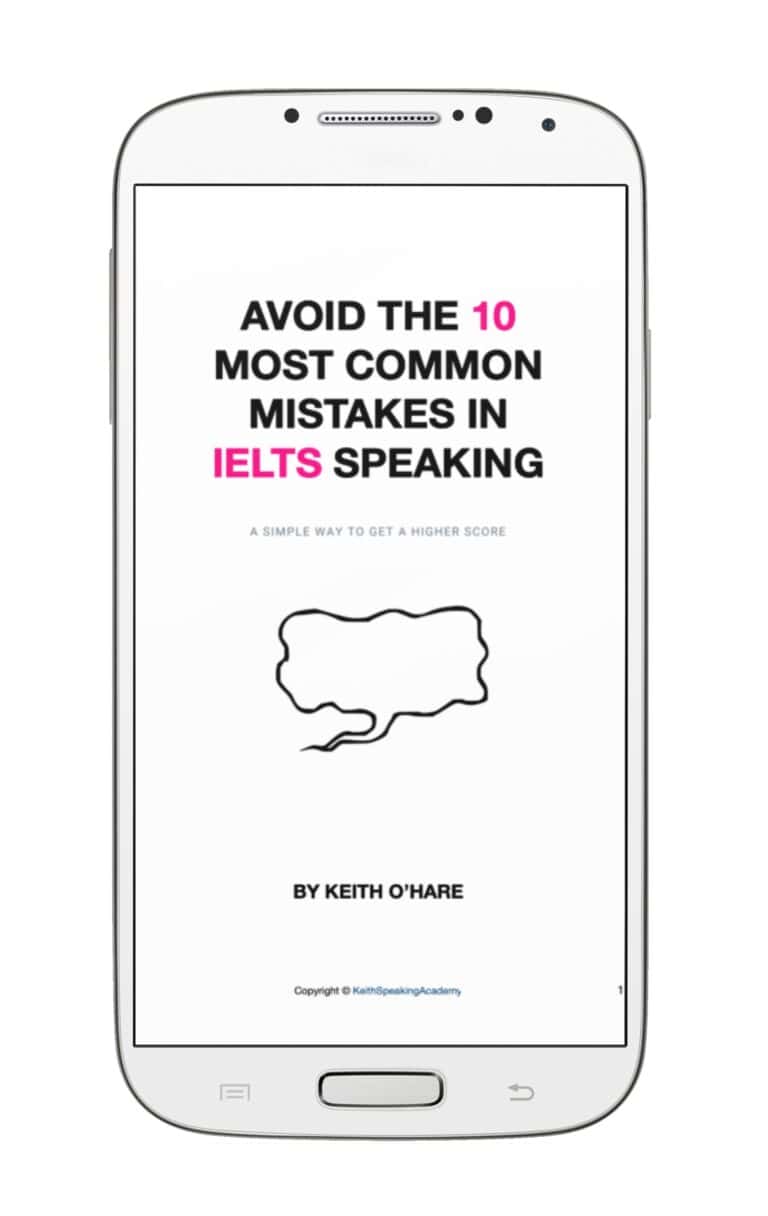IELTS Speaking Lesson about Countryside
👇 Take this lesson with you! 👇
Table of Contents
Introduction
In this lesson we are going to look at some great vocabulary, collocations and idioms you will need to talk about the Countryside in IELTS Speaking.
We will discuss features of the countryside, activities you can do there, as well as the pros and cons of living in the countryside
IELTS Speaking vocabulary: Countryside
The following mean related to the countryside
rural (adj.)
A rural area / view / lifestyle
rustic (adj.)
A rustic table / cabin /
This house has rustic charm
pastoral (adj.)
A pastoral scene / painting
The opposite of rural is urban.
urban (adj.) = related to the city
An urban landscape / area
Urban development / planning
IELTS Speaking vocabulary and collocations: Countryside
In order to speak more fluently, it is always a good idea to learn collocations of words, not just the individual word.
Here are some common ones for vocabulary on this topic of Countryside.
Rural landscape
Mountain range (a group of mountains)
Hiking in the hills
Steep valley
Dense forest (lots of trees close together)
Freshwater lake
Fast-flowing stream
Fields full of ______ (corn, flowers, wheat, etc…)
Cows and sheep graze in the fields
Farm produce (n.) (fresh food the farm sells – vegetables, meat, eggs…)
Farm crops
A field of cattle (cows, yak…)
Livestock (animals on a farm; e.g. cows, sheep, chickens…)
IELTS Speaking: Where people live
This is a common questions and here are the different areas where people may live.
I live ….
…in THE city centre
…downtown
…in the heart of the city
…slap bang in the city centre
…in the middle of the city
…in the suburbs (of the city)
…in / on the outskirts (of the city)
…in THE countryside
…in a village
…in a hamlet = small village

What to do in the countryside
Here are three useful ways to start talking about activities.
You can ____ visit….
The countryside is great for ____ visiting…
I like nothing better than _______ visiting…
Note: ‘You can’ is pronounced -/yekun/ because ‘can’ is unstressed.
Here are some activities you can do in the countryside
- Buy local produce from the farms
- Go hiking
- Go fishing
- Gaze at the stars
- Do some star-gazing
- Look at the constellations (shapes/patterns of stars)
- Have a picnic
- Learn to identify some trees, mushrooms, butterflies, constellations…
Pros and cons of living in the countryside
Pros / advantages
- Fresh air
- Lots of greenery
- A slow/laidback pace of life
- Quiet and peaceful
- Less air and noise pollution
- Low cost of living
Cons / disadvantages
- Weak communication network
- No Internet
- Fewer job opportunities
- Lack of essential facilities
- No hospitals
- Stuck out in the sticks (far away from other people)
- It can get lonely
IELTS listening task
1. Read the following text and guess what the missing words might be.
Get creative!
Put your answers in the comments below:
What I love about the countryside is the silence, the sounds, the [1]___________, and the views.
What can you not love about the countryside? It’s [2]__________.
I think it’s going to [3]__________ soon here.
The clouds are coming in.
The mist, look, the mist is rolling in over the hills, [4] __________ through the valleys.
Sure, tourism has come and I’m a great example of that, but it’s kept, it’s kind of pastoral beauty. It’s kept its closeness to nature.
In fact, just over the road, you can hear the [5]_____________. If you can hear him.
He’s starting to [6]________________ the milk from the cows and putting it through a churn. Can you hear that?
2. Now listen to the video and fill in the gaps in the text above.
Listening task tape script and answers
Click arrow to open/close answers
What I love about the countryside is the silence, the sounds, the [1] wind, the colours, the views.
What can you not love about the countryside? It’s [2] gorgeous = beautiful
I think it’s going to [3] rain soon here. The clouds are coming in.
The mist, look, the mist is rolling in over the hills, [4] billowing (=rolling like smoke) through the valleys, and this is the Pasiego valley, down south of Santander, but in the north of Spain. And it’s one of the, kind of the ‘olde worlde’ (=traditional) places that still remains in Spain.
Sure, tourism has come and I’m a great example of that, but it’s kept, it’s kind of pastoral (=rustic) beauty. It’s kept its closeness to nature.
In fact, just over the road, you can hear the [5] farmer. If you can hear him. He’s starting to [6] gather the milk from the cows and putting it through a churn. Can you hear that?
No! That’s a dog. Dogs, loads of them in the countryside.
Of course, one of the big things they do in this area is they make cheese, um, lots of different kinds of [7] cheeses.
I don’t know if you’re a cheese fan. I am. I love cheese, whether it’s blue cheese, Camembert – French, Manchego – Spanish, or Parmesan from Italy, all sorts of cheeses goes with all sorts of stuff, but here they, you know, churn out some of the best cheese in…
Cheese or cheeses? Cheese. It’s uncountable, unless you’re talking about types, it’s a bit like fish, right?
Fish, but fishes only if it’s different species of fish or types of fish, funny language, right? English,
Look at that you can see there are Eagles up there.
Idioms to talk about the countryside
To head outdoors (=to go in the direction of…) = to go outdoors
To soak up the views = absorb/ to enjoy the view
To take in the views = absorb/ to enjoy the view
The early bird catches the worm = if you get up early, you make the most of the day
To get up at the crack of dawn = to get up very early
It’s as old as the hills = it’s very old
To get away from the crowd = to escape the noise / hustle and bustle = find peace and quiet
Pronunciation Files For Vocabulary From My Best Live Lessons
Use Words EASILY in English Conversations!
More Free IELTS Speaking Lessons
If you liked this lesson, leave a comment below!
There are more lessons you can follow in the links below too.
COMPUTERS in IELTS Speaking. Describe the uses and challenges of computers using powerful vocabulary and idioms.
FOOD in IELTS Speaking. Vocabulary and collocations to talk about food, healthy food and cooking.
HOLIDAYS in IELTS Speaking. Discover the 10 things the British do on holiday and learn the useful vocabulary and idioms to talk about it.



Thank you so, this information is very useful to me.
Thank you so much, this information is very useful to me.
That’s great!
Here it’s my answer:
What I love about the countryside is the silence, the sounds, [1] the fresh air and the view.
What if you don’t love? It is [2] lack of smart technology
I think it’s going to rain here
The clouds are coming.
Fog, behold, the mist is rolling over the hills,[4] passing through the valleys.
Sure, tourism has come and I’m a great example of that, but it’s preserved, it’s a pastoral beauty. It is close to nature.
In fact, right across the street, you can hear [5] the sound of a farmer. If you can hear him.
He is starting [6] to exact milk from the cows and pass it through a stirrer. Did you hear that?
Nice – just note: Extract milk!
1. the farms
2. lack of technology
3. rain
4. pass
5. farmer
6. milk
Thank you so much Sir, I’m really making progress.
1. Atmosphere
2. Limited infrastructures
3.rain
4. Passing
5. Herdsman
6. Express
Pleased to see that!
1.beauty
2.climate
3.rain
4 revealing
5.noise
6.express
1- smells
2- the fog
3- be/ come
4- spreading
5- farmer/ milkman
6- milk
1. Cleaner environment
2. lesser infrastructure
3. rain
4. covering
5. farmer
6. squeezing
Dear friends,
This week our beloved sir wouldn’t be able to conduct the regular class scheduled for today because of his sudden health issues in his leg, the emergency health center visit and the doctor’s treatment and rest advice. Sorry for the inconvenience and we hope the same support and participation from all of you in upcoming days!!
He is out of danger though, and would definitely be better with our wishes and prayers for his speedy recovery!
So, let’s say together,
See you soon in the next live lesson Mr. Keith O’Hare , with added enthusiasm, good health and that lovely group teaching generosity! 💐❤️
I pray for God speed In his health. Wishing him soundness all round now and always in Jesus name.
Thank you so much for your kind words.
Thank you so much, I am indeed already ‘on the mend’ and hope to be much better next week.
I hope you will be back on your feet soon.
1 simplicity
2.difficult to have access to facilities
3 develop
4 road
5 sound
6 collect
1. nature
2. inconvenience
3. rain
4. running
5. farmer
6. hand (extract, squeeze)
1. air quality
2. spectacular
3. rain
4. passing
5. talking
6. get
1.Feel
2.unpredictable guests
3.drizzle
4.running
5.stream
6.straining
1. The smells
2. A great amount of insects
3. Rain
4. Passing
5. Cowherd
6. To get, to handmilk, to gather
1. nature
2. perfect
3. rain
4. passing
5.waterfall
6.milk
weather
magnificent.
rain
creeping
farmer
milk
😀
weather
magnificent.
rain
creeping
farmer
milk
1- Weather
2- Limited access to healthcare
3- Rain
4- Gets
5- Farmer
6- Milking
1. Serenity
2. Peaceful
3. Snow
4. Moving
5. Farmer
6. Extract
Ok
1. Peace
2. Amazing
3. Rain
4. Shrouding
5. Milkman
6. Draw
1.serenity
2.networking
3.drizzle
4.pass
5.shepherd
6.milking
1.greenary
2.poverty
3.rain
4.clouds
5.shepherd
6.milking
1.atmosphere
2.stunning/peaceful
3.rain
4.shrouded
5.farmer
6.squeeze
1. The fresh air
2. the lack of advanced facilities
3. improve
4. pass
5. the farmer
6. collect
1 fresh air
2 far from the city and its convenience
3 be raining
4 running
5 farmer/neighbor
6 collect
What a poetic exercise! You are a fine British man!
1. Tranquillity
2. Cloudy
3. Pour (down)
4. Peeking/Glancing
5. Farmer
6. Extract
1. Smells – ( newly cut grass,animal manures,smoke or burning grass )
2. Magnificently beautiful –
3. Rain 🌧
4. And
5. Farmer
6. Draw
2. Cons – it’s in the middle of nowhere.
4. Swift through
1: weather
2: windy weather sometimes
3: rain
4: going
5: farmer
6: express
1) the serenity
2) nothing
3)rain
4)moving wind
5)fetch
There is a little mistake.sequence should be like this.
The serenity, nothing,rain, slowly,the wind ,fetch.
There is a little mistake.sequence should be like this.
The serenity, nothing,rain, slowly,the wind ,fetch.
Sceneries
Network problem
Rain
All over
Farmer
Collect
1) The sound of the breeze
2) Lack of a bit network such as poor mobile signal and caused some awful weather conditions
3) rain heavily
4) passing through
5) villager and his sheepdog pup
6) do milking
1.Calmness
2. Effects of weather
3. Rain
4.moving
5.milker
6.squeeze
1. Fresh air.
2. Hard to think about something.
3. Drizzle.
4. You can see it.
5. Milk man.
6. Extract.
1 the space
2 transportation
3 rain
4 down
5 Milker / rancher
6 milking
1. Fresh air
2.healthy and transportation facilities
3. Be filled with amenities
4. passing
5. Farmer
6.milk
1.fields
2.lack of facilities
3.rain/drizzle
4.spreading
5.shepherd/farmer
6.milk
1. ambience
2. weather
3.rain
4.fog
5.🤔
6.collect
1.calmness
2. Windy
3.rain
4. Bending
5. Dairy man
6. Milk